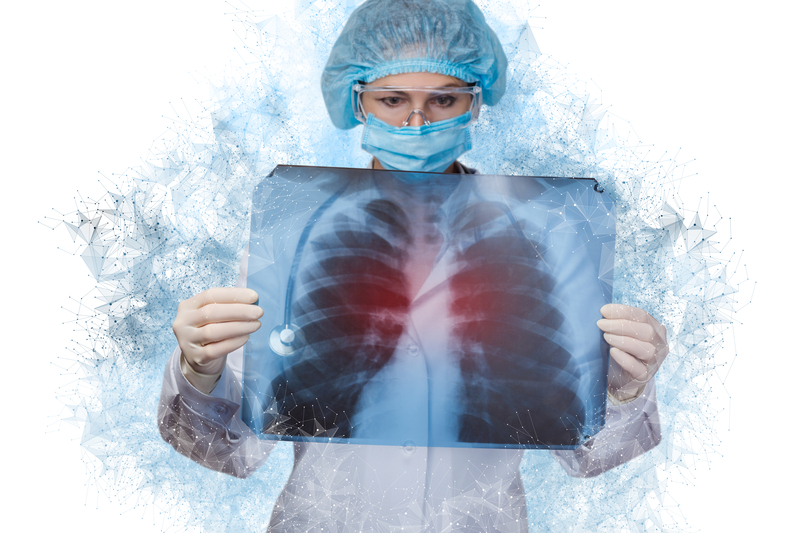By Korin Miller
The main symptoms of pneumonia—trouble breathing, chest pain, cough, and fever—are usually the same, no matter what type of pneumonia you have. But there’s more than one cause of pneumonia and figuring out what’s behind your illness can help doctors effectively treat your condition.
At the most basic level, pneumonia is an infection of the lungs that causes inflammation and fluid buildup in the lungs’ air sacs or alveoli, according to the Centers for Disease Control and Prevention (CDC). It can cause mild to severe illness in people of all ages. While you’re more likely to get pneumonia if you’re a smoker or have underlying medical conditions like diabetes or heart disease, any person of any age can get pneumonia, Raymond Casciari, MD, a pulmonologist at St. Joseph Hospital in Orange, California, tells Health.
Luckily, pneumonia isn’t completely unavoidable vaccines can help prevent some types of pneumonia, and so can practicing good hand hygiene and disinfecting frequently touched surfaces. Still, pneumonia happens. In 2017, 3 million people were diagnosed with pneumonia in emergency rooms around the US, according to data from the CDC—and that doesn’t include people who were diagnosed by their primary care physician.
To remain your healthiest and stay pneumonia-free (at least as much as humanly possible), it’s helpful to arm yourself with all the facts about pneumonia—and that includes what most commonly causes the lung infection. Here, experts explain the three main causes of pneumonia, and what you need to know about each.
Bacteria
Bacterial pneumonia is usually caused by Streptococcus pneumoniae, which lives in the upper respiratory tract, Dr. Casciari says. “This is the most common cause of pneumonia,” he adds.
You can develop bacterial pneumonia as a complication of a viral infection, like the cold or flu; due to aspirating or inhaling fluid like saliva or vomit; or you can just develop it on its own. “It used to be thought that the lungs were a sterile environment, devoid of bacteria. We now know that this is not true and that the lungs are ‘colonized’ by bacteria that are harmless under ordinary circumstances,” Marc A. Sala, MD, a pulmonologist, and assistant professor of medicine at Northwestern Medicine, tells Health. But, in some situations, like after a viral infection that disturbs the balance of bacteria in your lungs, you can develop bacterial pneumonia, he says.
While Streptococcus pneumoniae is the main cause of bacterial pneumonia, it’s not the only cause, says Dr. Casciari. Other types of bacteria known to cause pneumonia, per the US National Library of Medicine’s MedlinePlus resource, include:
Legionella pneumophila (pneumonia caused by this bacterium is more commonly known as Legionnaires’ disease)
Mycoplasma pneumoniae
Chlamydia pneumoniae
Haemophilus influenzae
Bacterial pneumonia is usually treated with oral antibiotics, Dr. Casciari says. But, in more severe cases, a patient may be given IV antibiotics, breathing treatments, or oxygen therapy, MedlinePlus says. Also worth noting, per the CDC: The pneumococcal vaccine can help lower your risk of contracting bacterial pneumonia from Streptococcus pneumoniae.
Viruses
There are a lot of viruses that can lead to viral pneumonia. Respiratory syncytial virus (RSV) is the most common cause of pneumonia in children, but the influenza virus and SARS-CoV-2, the virus that causes COVID-19, are the main causes of pneumonia in adults, Dr. Casciari says. MedlinePlus says the common cold also has the potential of leading to pneumonia.
“The typical way that one develops pneumonia is by being exposed to the droplets or aerosols of someone who has an active infection, resulting in inflammation and an immune response, which we then refer to as pneumonia,” Dr. Sala says. Viral pneumonias can also have a secondary bacterial infection, Dr. Casciari says.
Treatment for viral pneumonia usually involves the use of an antiviral treatment like oseltamivir (Tamiflu) or remdesivir, Dr. Casciari says. And just like with bacterial pneumonia, people with severe cases may need supplemental oxygen or breathing treatments.
Some vaccines can help lower your risk of developing viral pneumonia, including the flu vaccine and COVID-19 vaccine, Dr. Casciari says.
Fungi
Fungal pneumonia is more of a potential issue for people with chronic health complications or weakened immune systems. Nicola Hanania, MD, a pulmonologist at the Baylor College of Medicine, tells Health that doctors “don’t really see fungal pneumonia in people with normal immune systems.” But for people with diabetes, AIDS, HIV, or cancer, it may be a risk, she says.
“By and large, fungal pneumonia is not an issue for most people in the US, with the exception of a few organisms,” adds Dr. Sala. The fungal infections most commonly linked to pneumonia, per MedlinePlus, include:
Pneumocystis pneumonia (PCP), caused by the fungus Pneumocystis jiroveci
Valley fever or coccidioidomycosis, caused by the Coccidioides fungus
Histoplasmosis, caused by the Histoplasma fungus
Cryptococcosis, caused by the fungi Cryptococcus neoformans and Cryptococcus gattii
With fungal pneumonia, people are often infected when they breathe in certain fungal spores, Dr. Casciari says. Doctors will usually treat fungal pneumonia with antifungal medications like fluconazole.
If you’re experiencing any of the common signs of pneumonia—fever, chills, cough, and shortness of breath, among others—doctors say it’s important to seek treatment, no matter what could be behind it. “Pneumonia is serious,” Dr. Casciari says. “It can be deadly.”




